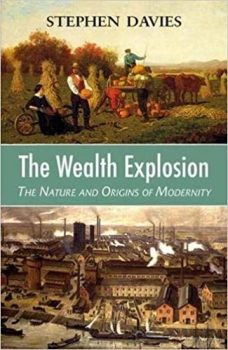I’ve followed the career of Stephen Davies ever since I got to know him in the 1980s. Here’s a photo I took of him in my home in January 2000, when he spoke at one of my last Friday of the month meetings.
Tonight, I photoed Stephen Davies again. Well, to be exact, he was on TV, and I photoed my TV:
That’s Davies doing a talking head job on the subject of Trains That Changed The World. Good to see the Institute of Economic Affairs also getting a good plug.
I’m watching these shows now, as I write this. The transformation of the lives of the great mass of working people and their families in countries like Britain and America in the nineteenth century is being well explained. Karl Marx, were he watching, would be cursing. Immiseration? Forget it. It was more like a wealth explosion, made possible by railways, probably more than any other technology.
During the last few years, it bothered me that Davies seemed to be doing so much – lots of educational outreach for the IEA, for instance – that he might not be finding time to write any books. Oh me of little faith. In April of 2019, this book will be published:
And oh look. It will be entitled The Wealth Explosion. If what Davies was saying on the TV is anything to go by, and it surely is, then railways will figure prominently in this book.
I just noticed that the Executive Producer of Trains That Changed The World was the famously anti-anti-capitalist Martin Durkin. That explains a lot.







The Great Western Railway creates standard time:
http://www.bbc.co.uk/blogs/wales/entries/8d6d68fa-1e6a-39e1-9f29-232450445f41
In the post Civil War U.S. structural engineering plus the transcontinental railway benefited from prolific inventor Henry Bessemer’s 1857 smelting process (in retrospect, hinted by Chinese and Western sources without removing carbon and manganese impurities).
Allied with financier J.P. Morgan, visionary railroad magnate James J. Hill not only shipped produce East to West for bulk cargoes overseas, but populated Michigan, Minnesota, and Wisconsin with hard-working Scandinavian farmers awarded land-grant properties along his right-of-way.
As in Roman times, communication and transport proved key to developing vital infrastructure, while Bessemer’s seminal innovation recycled scrap-iron to bridges, rails, high-rise buildings using Otis’ elevator.
All this occurred a mere five generations back… and yet, we’d bet not one in 100 contemporary citizens has any inkling that his twice-great grandparents lived in borderline paleolithic times.
I wonder if he talks about the fact that trains made truly mass war possible.
Not least was the technical advance of the invention of compounding in steam engines. Bigger, better, far more powerful engines consuming much less coal allowed the changes to be much greater and more rapid.
staghounds,
One might as well complain that cars made get-aways from bank robberies easier. It’s just how things are. Let’s take the positives, imagine how much quicker it can all get sorted, and there is the Czech Legion’s armoured train, which compliments the Czech Navy unit’s attack on a Bolshevik outpost near Lake Baikal during the Russian Civil War. This was the Czech’s only naval victory, I believe, the Bolsheviks arrogantly assuming that they were safe from naval attack from the forces of a landlocked country that didn’t yet exist and was to be thousands of miles away.
One matter that perhaps ran alongside the railways (sometimes literally) was the telegraph, and the ability to communicate information over great distances in real time was also a significant driver of efficiency and productivity. A perfect calm (as opposed to storm), making for better lives.
Mind you, one of my distant forebears was one of the first people killed by a train, a Methodist Minister (so presumably not totally Junckered) he somehow failed to notice a slow, belching steam engine bearing down on him at all of around 7 mph (I imagine) one Sunday afternoon stroll, and, sadly, died.
There is a constant refrain here in the States, calling for more (subsidized) passenger rail. So we will be more sophisticated and European, presumably. But, (you ask me)why? Doesn’t it make more sense to move freight and goods from depot to depot, whence they will be dispatched with dispatch, instead of large amounts of smelly humans who don’t want to be stranded at the station, and will clog the roads with Taxis and Ubers and Lyfts, contributing to the already existing traffic snarls? I’m glad you asked me that. Now, you there in the back. You had a question?
What once took 2,500 years, then 250, now takes twenty-five. Anyone thinking to project AD 2100 from 2000 might consider 1800 vs. 1900, then 1900 vs. 2000. To put it mildly, from electricity to telegraph and telephone; radio and TV, autos and aircraft; cybernetics, DNA, nuclear energy, robotics/AI and space probes, are simply inconceivable to 18th Century exemplars.
Edison’s research laboratory, Ford’s mass-production, Pasteur’s scientific medicine are but prelude to hyperlinked neural nets informing nigh-immortal symbionts moving off-planet to giant refugia set for quantum telesponding to the stars.
Just FYI, after the battle of Manzikert (1071 AD), the Seljuks exterminated the population of Anatolia, then the wealthiest, most advanced and densely populated province in the whole area of Christendom and the dar al-islam combined. Later, the Mongols gave north China the same treatment. In both cases, horses sufficed to move masses of invaders to areas where they could cause mass death.
Conversely, had trains not existed in 1860, could the Confederacy have won its war? Without trains, the western campaigns would have taken a lot longer, if they could have happened at all, and it was in the west that the Federals won the war; they were held off in the east till after the outcome was decided in the west.
Mass warfare was done long before the railways. Julius Caesar killed a third of the population of what is now France – and enslaved another third. Genghis Khan may have killed a tenth of the population of the ENTIRE WORLD.
And that is just two conquers among MANY.
In terms of men involved perhaps the biggest sea battle of all time (more men than any modern sea battle – even those between the Japanese and the Americans of the 2nd World War) was between Rome and Carthage – Rome won. I often wonder if it would have been better or worse if that struggle had gone the other way.
But what of the time just before the railways?
That would be the time of the French Revolutionary and Napoleonic Wars – with millions under arms, and MILLIONS (yes millions) killed, between 1789 and 1815 – and all without railways. Alth9ugh YES – the Prussians made evil use of the railways in 1866 and 1870 and in 1914.
Dr Davies, although we are not friends (far from it), is clearly CORRECT in his view that the railways were a good-thing and greatly expanded prosperity – they made life better, or at least less bad, than it had been.
However, one can get carried away in any craze – and I am sure that Dr Davies in his book (good scholar that he is) mentions that some people invested wildly (very unwisely) in their railway investments and were bankrupted (with great suffering to their families). And that sometimes Parliament, caught up in the craze, acted unjustly – giving railways “rights of way” without the consent of private landowners.
Such injustice was NOT necessary – for example when the landowners of Stamford decided they did not want the “East Coast Mainline”, it went via Peterborough instead. There was no need for Parliament to commit the injustice of “rights of way”.